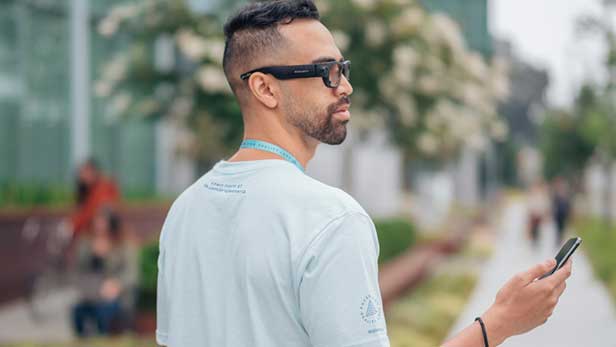Strategy September 18, 2020
Facebook Announces Smart Glasses
The social media giant plans to release Ray-Ban branded wearable tech next year; it’s also launching a research project to pave the way for next level augmented reality.
Smart glasses have been a hard sell for the general public. Products like Google Glass and Snap Spectacles never really caught on at a mass scale, though Glass lives on as an option for hands-free workers. Amazon’s newish Echo Frames, which let you access Alexa on the go, leave a lot to be desired as well, according to reviewers.
Now, Facebook is making its own bid in the futuristic frame war. CEO Mark Zuckerberg announced at the social media giant’s all-virtual Facebook Connect conference that it plans to release consumer smart glasses next year.

Facebook announced that it plans to release Ray-Ban branded smart glasses next year, though they haven’t revealed what features the frames will have.
“We don’t have a product yet to share with you today, but I am excited to share that we have formed a multiyear partnership starting with building and releasing our first pair of smart glasses next year,” Zuckerberg said during the conference.
Facebook is partnering with luxury eyewear brand Luxottica, and its new smart glasses will have Ray-Ban branding. Zuckerberg said the Luxottica partnership will help accommodate a variety of styles and preferences people would have for the glasses.
The company was tight-lipped on what the actual feature set of the new product would be, but did confirm to media outlets like TechCrunch that the glasses would not include a heads-up display, nor would they be classified as AR devices, leading analysts to speculate that they would be more like Snapchat’s Spectacles, than Google Glass.

Facebook will begin testing out Project Aria research glasses this month to gather data to create augmented reality wearable tech in the future.
Facebook says the consumer glasses will be its first step in its overall work in augmented reality. Facebook also recently unveiled Project Aria, a research project that it hopes will help usher in the first generation of wearable AR devices. “The Project Aria glasses are not a consumer product, nor are they a prototype,” Facebook announced in a release. “They won’t display any information on the inside of the lens, and research participants cannot view or listen to the raw data captured by the device.”
Instead, the research devices “will use sensors to capture video and audio from the wearer’s point of view, as well as eye movement and location data to help our engineers and programmers figure out how AR can work in practice,” Facebook’s news release explained. “The glasses will encrypt, compress and store data until it’s uploaded to our separate, designated back-end storage systems.”
Starting this month, the Project Aria glasses will be given out to a small group of Facebook employees and contractors in the U.S., who will wear the glasses throughout the day to gather data for things like head-tracking, eye-tracking and audio algorithms.
Considering one of the biggest criticisms of Google Glass back in the day was the lack of privacy inherent with a device that could be recording video without onlookers’ knowledge or consent, Facebook has taken pains to outline all the privacy steps it’s taking with these research classes. For example, Facebook notes that any data gathered in a public place will have faces and license plates automatically blurred before researchers look at it, and the research glasses don’t employ facial recognition identification technology. Facebook says it consulted with several privacy experts to develop its data protection controls. “As we continue to explore the possibilities of AR, we’ll continue to engage with privacy experts and refine our policies,” the company noted.
Some of the possibilities Facebook envisions for AR glasses in the future include: calling a friend and “chatting with their lifelike avatar across the table,” providing “intuitive navigation support to people with disabilities,” assisting with worker training, let you hear better in noisy areas or easily pull up stats to show at a business meeting. “We’re envisioning a time when we have all the benefits of connectivity (and more), without the need to keep our heads and our eyes down, looking at a device,” the company explains.
Much of the proposed applications are still the realm of science fiction, of course, but Facebook is hoping the Aria research project will help usher them into reality.
